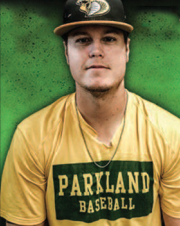
Jon Goebel went 38-17 in his first full season as head coach at Parkland College in 2019, after serving the previous four seasons as the Cobras’ pitching coach. During his tenure as an assistant, Goebel oversaw 21 pitchers that were either drafted by MLB clubs or signed to
DI programs. He played four years of collegiate baseball at Forest Park Community College and Bradley University.
Inside Pitch: As a person who played junior college and in Division I, what are your thoughts on JC baseball as a whole?
Jon Goebel: I love it. You get unique athletes at the JC level. The talent is still top end, yet you also get guys with a chip on their shoulder. A high school recruit who was “passed over,” a DI kickback who may have been “exiled,” the JC athlete typically has a very specific point to prove and I like that environment. JC provides a lot of what young athletes need – bigger roster sizes where you have to earn everything you get; more games throughout the year to learn how to compete, challenging travel where your mental and physical toughness will be tested...there is something very developmental about trying to do more with less.
IP: Any advice to those who want to play DI baseball?
JG: Understand what DI baseball is trying to recruit and then work to be that. I remind my guys all the time that we have to develop into what the recruiting market is currently prioritizing and looking for.
There are many ways to do that, but you have to be honest with yourself and what your timeline is. We only have most guys for two years max, so we have to balance what checkpoints we can get to in that small timeframe to create the most recruitable DI athlete.
IP: What’s your bottom-line message to those who are considering junior college baseball?
JG: Do it. You won’t regret it. Our sport is quite simply just more player-friendly than NCAA baseball. We can practice more, play more, lift more, train more, and pay less. At the end of the day, a player's self-interests are simply prioritized more at the JC level.
IP: How do you identify and develop talent from a pitching standpoint?
JG: The first thing I am going to look for is "presentation" – how they are moving while throwing. Arm action and movement quality during the delivery is big for me. It doesn’t have to be perfect, but there’s a base of movement quality that we are looking for. Once we get them, our first focus is horsepower, physicality. We are trying to add velocity, durability, and recovery response time. It’s our goal to get our guys recruited to top levels of baseball and right now, the industry is most intrigued by velocity. We’re not going to ignore that.
Another thing we value is the development of the breaking ball. It’s huge for us. We have a staff full of hard throwers, but we probably throw the largest percentage of breaking balls in our region. The breaking ball opens up everything, and I’ve found that a lot of amateur pitchers can actually command that pitch better than their fastballs.
IP: Alright, if you were Commissioner for a day – assuming everything was back to normal regarding the MLB season – how would you change big league baseball?
JG: DH in both leagues. And by the way, I love the new playoff expansion idea, where higher-seeded teams select opponents with a selection show. That would really create a lot of buzz for the sport.
I’m a big English Premier League fan, so another thing I’d do is create a player loan system. You would need to create some stipulations in terms of who is eligible (age, service time, etc.), but two hot topics right now are young players not getting paid earlier and small market teams not being able to keep their homegrown stars, right?
The EPL loan system works great – when you have young players developing into superstars on bad teams, the benefits are slim all around. You won’t see that player in the playoffs and they will inevitably leave their homegrown team. With a loan system, that player could be loaned out to a playoff team, garner vital experience in the playoffs, and their parent club generates revenue to then keep that player longterm down the road or be used in free agency.